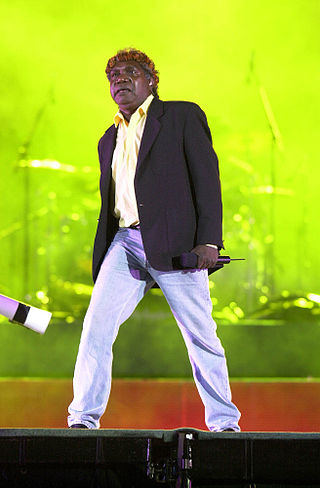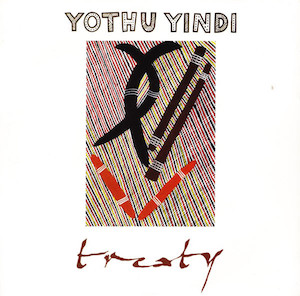Related Research Articles

Yothu Yindi are an Australian musical group with Aboriginal and non-Aboriginal members, formed in 1986 as a merger of two bands formed in 1985 – a white rock group called the Swamp Jockeys, and an unnamed Aboriginal folk group consisting of Mandawuy Yunupingu, Witiyana Marika, and Milkayngu Mununggur. The Aboriginal members came from Yolngu homelands near Yirrkala on the Gove Peninsula in Northern Territory's Arnhem Land. Founding members included Stuart Kellaway on bass guitar, Cal Williams on lead guitar, Andrew Belletty on drums, Witiyana Marika on manikay, bilma and dance, Milkayngu Mununggurr on yidaki, Geoffrey Gurrumul Yunupingu on keyboards, guitar, and percussion, past lead singer Mandawuy Yunupingu and present Yirrnga Yunupingu on vocals and guitar.

Homeland Movement is the debut studio album by Australian rock band Yothu Yindi that was released in April 1989 on the Mushroom Records label. The album peaked at number 59 on the ARIA Chart in 1992.

Tribal Voice is the second studio album by Yothu Yindi, released in September 1991 on the Mushroom Records label. The album peaked at number 4 on the ARIA Charts and was certified 2× Platinum.

Freedom is the third studio album by Australian band, Yothu Yindi released in 1993. The album peaked at number 31 on the ARIA charts.

Mandawuy Djarrtjuntjun Yunupingu, formerly Tom Djambayang Bakamana Yunupingu, and also known as Dr Yunupingu, was a teacher and musician, and frontman of the Aboriginal rock group Yothu Yindi from 1986. He was an Aboriginal Australian man of the Yolŋu people, with a skin name of Gudjuk.

The Yolngu or Yolŋu are an aggregation of Aboriginal Australian people inhabiting north-eastern Arnhem Land in the Northern Territory of Australia. Yolngu means "person" in the Yolŋu languages. The terms Murngin, Wulamba, Yalnumata, Murrgin and Yulangor were formerly used by some anthropologists for the Yolngu.

Yirrkala is a small community in East Arnhem Region, Northern Territory, Australia, 18 kilometres (11 mi) southeast of the large mining town of Nhulunbuy, on the Gove Peninsula in Arnhem Land.

Yolŋu Matha, meaning the 'Yolŋu tongue', is a linguistic family that includes the languages of the Yolngu, the indigenous people of northeast Arnhem Land in northern Australia. The ŋ in Yolŋu is pronounced as the ng in singing.
Yunupingu, also spelt Yunupiŋu, is the family name of a number of notable Aboriginal Australians from the Yolŋu people of Arnhem Land, who are closely connected with the Marika and Gurruwiwi families.
Marika is a both a given name and surname. As a feminine given name, it is of Hungarian and Greek origin; a diminutive of Maria. Apart from Hungary and Greece, the name is also found in Czechia, Estonia, Finland, Japan, Sweden, Slovakia and Poland. In Fiji, it is a masculine given name.

Yolngu Boy is a 2001 Australian coming-of-age film directed by Stephen Maxwell Johnson, produced by Patricia Edgar, Gordon Glenn, Galarrwuy Yunupingu and Mandawuy Yunupingu, and starring Sean Mununggurr, John Sebastian Pilakui, and Nathan Daniels. Yolngu Boy is based around three Aboriginal teenage boys linked by ceremony, kinship and a common dream-to become great Yolngu hunters, in a remote community at Yirrkala in North-East Arnhem Land in the Northern Territory of Australia. The feature film traces the metaphorical journey of the three young Aboriginal teenagers caught in a collision between the modern world and traditional Aboriginal culture where they hunt wild animals in the morning using spears and play football while listening to hip hop rap music in the afternoon. The project involved a significant number of community members in the cast and crew of the film.
Raymattja Marika, also known as Gunutjpitt Gunuwanga, was a Yolngu leader, scholar, educator, translator, linguist and cultural advocate for Aboriginal Australians. She was a Director of Reconciliation Australia and a member of the Australian Institute of Aboriginal and Torres Strait Islander Studies. She was also a director of the Yothu Yindi Foundation and a participant in the 2020 Summit, which was held in April 2008. Marika advocated understanding and reconciliation between Indigenous Australian and Western cultures.
Saltwater Band are an Indigenous roots band from Galiwin'ku on Elcho Island, around 560 kilometres from Darwin. The members are Yolngu and they sing mostly in Yolngu languages. Their songs are a mixture of traditional songs and reggae/ska influenced pop. One member of the band, the late Geoffrey Gurrumul Yunupingu, is a close relative of Mandawuy Yunupingu of Yothu Yindi and was a past member of Yothu Yindi.

"Treaty" is a protest song by Australian musical group Yothu Yindi, which is made up of Aboriginal and balanda (non-Aboriginal) members. Released in June 1991, "Treaty" was the first song by a predominantly Aboriginal band to chart in Australia and was the first song partly in any Aboriginal Australian language to gain extensive international recognition, peaking at No. 6 on the Billboard Hot Dance Club Play singles charts. The song contains lyrics in Gumatj, one of the Yolngu Matha dialects and a language of the Yolngu people of Arnhem Land in northern Australia.

High Ground is a 2020 Australian film directed by Stephen Maxwell Johnson, based on historical events that took place in Arnhem Land in the Northern Territory of Australia, set just after World War I. It has variously been called a revisionist Western and meat pie Western. However it tells of a true historical event in a fictionalised manner but with very close attention to and respect for Aboriginal culture.
The National Indigenous Music Awards 2016 were the 13th annual National Indigenous Music Awards.
Witiyana Marika is an Aboriginal Australian musician, filmmaker and elder, known for being a founding member of the band Yothu Yindi and producer of the film High Ground.
Yirrmal Marika, known mononymously as Yirrmal, is an Indigenous Australian vocalist. A Yolngu man, his music features traditional sounds and elements of Yolŋu music.
Banula (David) Marika is an Aboriginal Australian dancer, actor, singer and performer from Yirrkala in North East Arnhem Land, in the Northern Territory of Australia. The son of Roy Marika, he is a member of the Rirratjingu clan of the Yolngu people, and is known for his performances with the Bangarra Dance Theatre since the 1990s.
Gavin Campbell is an Australian club DJ and remixer based in Melbourne, Victoria. He created the dance music production outfit known as Filthy Lucre, which is known for its 1991 remix of Yothu Yindi's single "Treaty", known as "Treaty ".
References
- 1 2 3 4 5 "Stephen Johnson". Ronin Films . Retrieved 19 April 2022.
- 1 2 3 Johnson, Stephen Maxwell (26 January 2021). "Stephen Maxwell Johnson: Taking The High Ground". FilmInk (Interview). Interviewed by Mottram, James. Retrieved 18 April 2022.
- 1 2 3 4 Johnson, Stephen Maxwell (13 May 2021). "Interview: 'High Ground' Director Stephen Maxwell Johnson". Script Magazine (Interview). Interviewed by Dean, Sadie. Retrieved 18 April 2022.
- 1 2 3 4 Milner, Johnny (March 2021). "Deep Dive: High Ground: Q&A with Stephen Maxwell Johnson" (Audio (52 mins) + text). NFSA . Retrieved 17 April 2022.
- 1 2 3 4 Johnson, Stephen Maxwell (12 May 2021). "High Ground – Director Stephen Maxwell Johnson" (Audio (16 min.) + text). Film School Radio (Interview). Interviewed by Kaspar, Mike. Retrieved 19 April 2022.
- 1 2 Gumurdul, Julie Narndal; Rademaker, Laura; May, Sally K. (9 February 2021). "How historically accurate is the film High Ground? The violence it depicts is uncomfortably close to the truth". The Conversation . Retrieved 18 April 2022.
- ↑ "1993: 7th Annual ARIA Awards". ARIA Music Awards. Archived from the original on 27 September 2011.
- ↑ "Tribal Voice (1993) - The Screen Guide". Screen Australia. 16 March 2018. Retrieved 19 April 2022.
- ↑ Pomeranz, Margaret (1 January 2009). "Yolngu Boy review: A truly impressive film". SBS Movies. Retrieved 18 April 2022.
- ↑ "Yolngu Boy". Rotten Tomatoes. 9 January 2018. Retrieved 18 April 2022.
- ↑ "Gan Gan". Colonial Frontier Massacres in Australia, 1788-1930. Centre for 21st Century Humanities, University of Newcastle (Australia) . Retrieved 18 April 2022.
- ↑ Johnson, Stephen Maxwell; Marika, Witiyana (3 January 2021). "Interview: Stephen Maxwell Johnson & Witiyana Marika". Glam Adelaide (Interview). Interviewed by Ellis, Jordan. Retrieved 19 April 2022.
- ↑ Tyrrell, Caitlin (13 May 2021). "High Ground Director Stephen Maxwell Johnson Reveals How Intense Research Led To A Multigenerational Story". The Illuminerdi. Retrieved 19 April 2022.
- ↑ Vann-Wall, Silvi (3 February 2022). "High Ground, Nitram take top gongs at the FCCA awards". ScreenHub Australia. Retrieved 19 April 2022.
- ↑ Keast, Jackie (31 October 2021). "'High Ground', 'The Newsreader' lead early AACTA Award nominations". IF Magazine . Retrieved 19 April 2022.
- ↑ ARIA Award previous winners. "Winners by Award – Artisan Awards – Best Video". Australian Recording Industry Association (ARIA). Retrieved 12 December 2019.